Related Research Articles

Williamsburg is an independent city in the Commonwealth of Virginia, United States. As of the 2010 U.S. Census, the population was 14,068. In 2014, the population was estimated to be 14,691. Located on the Virginia Peninsula, Williamsburg is in the northern part of the Hampton Roads metropolitan area. It is bordered by James City County and York County.

James City County is a county located in the Commonwealth of Virginia. As of the 2010 census, the population was 67,009. Although politically separate from the county, the county seat is the adjacent independent city of Williamsburg.
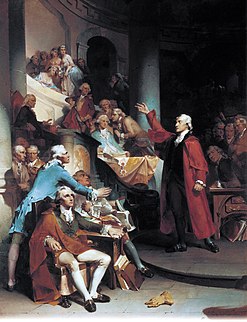
The Virginia House of Burgesses was formed in 1642/43 by the General Assembly. By its creation, the General Assembly then became bicameral.
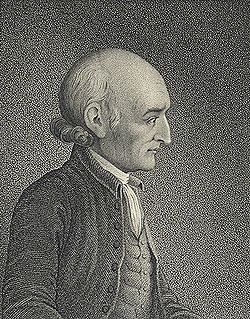
George Wythe was the first American law professor, a noted classics scholar, and a Virginia judge. The first of the seven Virginia signatories of the United States Declaration of Independence, Wythe served as one of Virginia's representatives to the Continental Congress and the Philadelphia Convention. Wythe taught and was a mentor to Thomas Jefferson, John Marshall, Henry Clay and other men who became American leaders.

The Virginia Peninsula is a peninsula in southeast Virginia, USA, bounded by the York River, James River, Hampton Roads and Chesapeake Bay. It is sometimes known as the Lower Peninsula to distinguish it from two other peninsulas to the north, the Middle Peninsula and the Northern Neck.
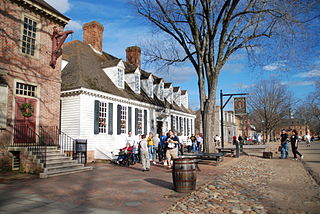
Colonial Williamsburg is a living-history museum and private foundation presenting part of an historic district in the city of Williamsburg, Virginia, United States. Colonial Williamsburg's 301-acre (122 ha) Historic Area includes buildings from the 18th century, as well as 17th-century, 19th-century, and Colonial Revival structures, as well as more recent reconstructions. The Historic Area is an interpretation of a colonial American city, with exhibits of dozens of restored or re-created buildings related to its colonial and American Revolutionary War history. Colonial Williamsburg's Historic Area's combination of restoration and re-creation of parts of the colonial town's three main thoroughfares and their connecting side streets attempts to suggest the atmosphere and the circumstances of 18th-century Americans. Colonial Williamsburg's motto has been: "That the future may learn from the past".
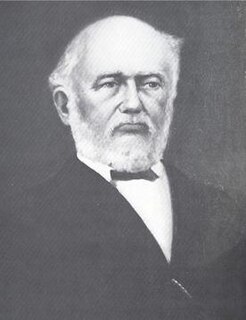
Benjamin Stoddert Ewell was a United States and Confederate army officer, civil engineer, and educator from James City County, Virginia. He graduated from the U.S. Military Academy at West Point, New York in 1832 and served as an officer and educator.
William Archer Rutherfoord Goodwin was an Episcopal priest, historian, and author. As the rector of Bruton Parish Church, Goodwin began the 20th century preservation and restoration effort which resulted in Colonial Williamsburg in Virginia. He is thus sometimes called "the Father of the Restoration of Colonial Williamsburg."
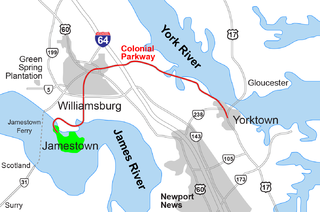
The Historic Triangle includes three historic colonial communities located on the Virginia Peninsula of the United States and is bounded by the York River on the north and the James River on the south. The points that form the triangle are Jamestown, Colonial Williamsburg, and Yorktown. They feature many restored attractions and are linked by the Colonial Parkway in James City and York counties, and the City of Williamsburg.

State Route 5 runs between the independent cities of Richmond and Williamsburg in the U.S. state of Virginia. Between Charles City County and James City County, it crosses the Chickahominy River via the Judith Stewart Dresser Bridge, a fixed-span bridge which replaced historic Barrett's Ferry and the former drawbridge.

Legacy is an American soccer team based in Williamsburg, Virginia, United States. The team plays in the Mid-Atlantic Conference of the National Premier Soccer League (NPSL), the fourth tier of the American soccer pyramid.

The Governor's Palace in Williamsburg, Virginia was the official residence of the Royal Governors of the Colony of Virginia. It was also a home for two of Virginia's post-colonial governors, Patrick Henry and Thomas Jefferson, until the capital was moved to Richmond in 1780, and with it the Governor's residence. The main house burned down in 1781, though the outbuildings survived for some time after.
The Virginia Gazette is the local newspaper of Williamsburg, Virginia. Established in 1930, it is named for the historical Virginia Gazette published between 1736 and 1780. It is published twice a week in the broadsheet format.

The Gunpowder Incident was a conflict early in the American Revolutionary War between Lord Dunmore, the Royal Governor of the Colony of Virginia, and militia led by Patrick Henry. On April 20, 1775, one day after the Battles of Lexington and Concord, Lord Dunmore ordered the removal of the gunpowder from the magazine in Williamsburg, Virginia to a Royal Navy ship.

Carter's Grove, also known as Carter's Grove Plantation, is a 750-acre (300 ha) plantation located on the north shore of the James River in the Grove Community of southeastern James City County in the Virginia Peninsula area of the Hampton Roads region of Virginia in the United States.

The Raleigh Tavern was a tavern in Williamsburg, Virginia, and was one of the largest taverns in colonial Virginia. It gained some fame in the pre-American Revolutionary War Colony of Virginia as a gathering place for legislators after several Royal Governors officially dissolved the House of Burgesses, the elected legislative body, when their actions did not suit the Crown. It was also the site of the founding of the Phi Beta Kappa Society on December 5, 1776.
Virginia furniture is furniture that originates from the U.S. state of Virginia. Furniture was first produced in Virginia during the Colonial period and continued through the Industrial Revolution. Furniture production has decreased in recent times due to imported furniture, but Virginia is still home to a few large furniture companies.

Episcopal Diocese of Southern Virginia is the diocese of the Episcopal Church in the United States of America located in the southeast area of Virginia. It is in Province III. The diocese includes the Hampton Roads area; Richmond south of the James River; most of the region known as Southside Virginia; and Northampton County, the southernmost of the two counties on the Eastern Shore of Virginia.
Grover Ashton Dovell was an American politician and lawyer. A Democrat, he served in the Virginia House of Delegates 1924–42 and was its Speaker 1936–42.

William Hunter was a colonial American newspaper publisher, book publisher, and printer for the colony of Virginia.
References
- Robert P. Maccubbin; Martha Hamilton-Phillips; Williamsburg (Va.). 300th Anniversary Commission (July 2000). Williamsburg, Virginia: a city before the state, 1699-1999. City of Williamsburg. p. 298.
| Preceded by incomplete record | Mayor of Williamsburg, Virginia 1812–1813 | Succeeded by incomplete record |
| Preceded by incomplete record | Mayor of Williamsburg, Virginia 1820–1821 | Succeeded by incomplete record |
| Preceded by incomplete record | Mayor of Williamsburg, Virginia 1828–1829 | Succeeded by W. W. Webb |
| This article about a mayor in Virginia is a stub. You can help Wikipedia by expanding it. |